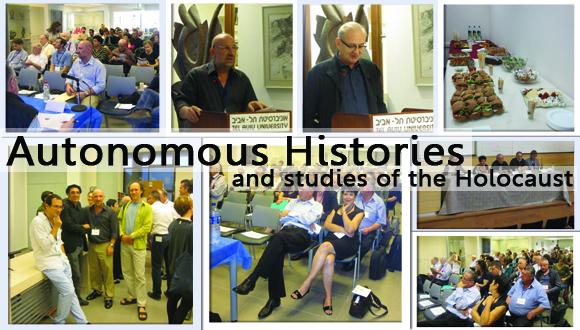Conference - Call for Papers - November 2013
Autonomous Histories and Studies of the Holocaust
Call for Papers
Tel Aviv University and Bar-Ilan University
November 4-5, 2013
Co-organizers:
Wiener Library for the Study of the Nazi Era and the Holocaust (Sourasky Central Library), TAU
Kantor Center for the Study of Contemporary European Jewry, TAU
Minerva Institute for German History, TAU
The Arnold and Leona Finkler Institute of Holocaust Research, Bar-Ilan University
Friedrich-Ebert-Stiftung, Israel
Over the past six decades Holocaust studies have developed in two distinct directions: studies on the perpetrators, on the one hand, and studies on the victims’ experiences and responses, on the other.
Since the end of World War II, the historiography of the Nazi regime, and particularly its “machinery of destruction,” to use Raul Hilberg’s phrase, has undergone several phases of historical controversy, relating to a number of complex theoretical problems of interpretation. These have ranged from the search for conceptual models, such as totalitarianism, through the Historikerstreit, to more recent debates over issues such as the impact of economic and demographic considerations vis-à-vis ideological obsessions, dealing with the perpetrators as “ordinary men” or “willing executioners,” and investigating the Wehrmacht and its crimes in the East.
The Jewish dimension in writing the history of the Holocaust, however, has developed as an autonomous field. This school, which perceives National Socialism and its atrocities through the prism of the Jewish tragedy, has concentrated solely on the persecution of the Jews since 1933, and especially on the tragic fate of the Jewish communities. A major area of investigation has been internal Jewish life, particularly in the ghettos. It has dealt with various aspects of the Jewish response to the Nazi policy of destruction, such as the role of Jewish leadership, alleged Jewish “self rule,” and the disturbing question of collaboration versus resistance. In contrast to the historiography of the perpetrators, which is solely document-based, the historiography of the victims incorporates testimonies of survivors as a major source of information.
The organizers of this conference are seeking proposals that illuminate fundamental questions regarding the conflict as well as the interplay and meeting points between these two trends. Discussions should focus on the conceptual and methodological aspects involved in this long lasting disintegration, or what Shaul Friedlander termed “autonomous histories.” We call for proposals in different disciplines and research areas of Holocaust studies, such as history, political science, philosophy, sociology, psychology, literature, visual art, law, and education.
The conference will be conducted in English. Proposals for individual papers, panels, and roundtable discussions will be considered. The deadline for the submission of proposals is June 15, 2013. All proposals should include a 300-500 word abstract, contact information, and a short bio.
Please send your proposal to:
Lodging and partial subsidy of travel cost may be available
Cover of travel and lodging may be available.
We would be grateful if you would circulate this CFP among potentially interested junior and senior scholars.
Sincerely,
Dr. Roni Stauber
Conference Organizer
Academic Director, Wiener Library
Program Committee:
Prof. Dina Porat (TAU), Prof. Dan Michman (BIU), Prof. Galli Shahar (TAU), Dr. Roni Stauber (TAU), Ms. Anita Haviv (Friedrich-Ebert-Stiftung, Israel)
Program Coordinator: Ms. Tali Opatowski (TAU)
Autonomous Histories and Studies of the Holocaust - Abstracts


